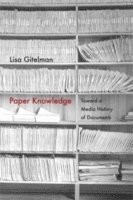
- Format
- Häftad (Paperback / softback)
- Språk
- Engelska
- Antal sidor
- 224
- Utgivningsdatum
- 2014-03-28
- Förlag
- Duke University Press
- Illustrationer
- 11 photographs
- Dimensioner
- 226 x 152 x 15 mm
- Vikt
- Antal komponenter
- 1
- ISBN
- 9780822356578
- 359 g
Paper Knowledge
Toward a Media History of Documents
- Skickas från oss inom 5-8 vardagar.
- Fri frakt över 249 kr för privatkunder i Sverige.
Passar bra ihop
De som köpt den här boken har ofta också köpt Taming 7 av Chloe Walsh (häftad).
Köp båda 2 för 542 krKundrecensioner
Fler böcker av Lisa Gitelman
-
New Media, 1740-1915
Lisa Gitelman, Geoffrey B Pingree
-
Always Already New
Lisa Gitelman
-
Scripts, Grooves, and Writing Machines
Lisa Gitelman
Recensioner i media
Four intriguing essays make up this tantalising and ambitious short book. . . . The strength of this bold volume is in its argument that we can learn a great deal if we focus, not only on what information they contain but what institutional and social function they serve; not what theyre about but what they do. -- Colin Higgins * Times Higher Education * "In all cases, Gitelman offers a meticulous reconstruction of the historical context of the media changes she foregrounds and in many regards this book is a real Wunderkammer. At the same time, however, the author always scrutinizes the past in order to show what it can mean for us today, and here the political dimension of the book comes to the fore. For Paper Knowledge is also a passionate discussion of what knowing and showing are about, namely the possibility to producing, sharing, debating knowledge in a society to opens this knowledge to all of its members and whose structure, thanks to technology, is no longer determined by those who know and show and those who don't." -- Jan Baetens * Leonardo Reviews * Gitelman practices a kind of conceptual archeology without obeisance to the master, in an argument that stands well on its own. . . . By the time you reach the book's final chapter, on the rise of PDF, the relationship between the history of ground-level print culture and that of its Ivory Tower analog seem linked in so many suggestive ways that the advent of digital culture seems like just one part of an intricate pattern. -- Scott McLemee * Inside Higher Ed * "A well-rounded exploration of publishing technology and how it transforms every aspect of our lives, from the way we are governed to the way we read books and news." -- Alexander von Lnen * Somatosphere * The proliferation of marriage certificates and death warrants holds few terrors for Lisa Gitelman, who finds richness rather than ennui in them. Her ingenious essay in media archaeology, Paper Knowledge, takes as its central category the document. The document is a material genre; the words matter, but so too does their physical instantiation, which is often accompanied by a baroque flummery of water-marks, seals and signatures. And the document is remarkable as a product of print that does not ask to be read. Instead, documents are used to hold us in place within a web of bureaucratic institutions. -- Jason Scott-Warren * TLS * Every chapter in Paper Knowledge stands on its own as a complete history. Each chapter provides the reader with a better understanding of the symbiotic relationship between printed document and the global economy. Paper Knowledge turns the focus of Media Studies from the Big Cultural Object and applies the same rigor to printed objects that were never designed to be noticed in the first place. And these forgotten objects carry with them the history of how we really understand the richness of media in our lives. -- John Rodzvilla * Publishing Research Quarterly * Gitelmans richly detailed excavation of institutional artifacts that shape material and semiotic processes (such as the job printedblank form and the PDF file) encourages rhetorical critics to stop flattening media into texts and start fleshing out documents as media with specific histories and utilities, transient technologies that leave a substantial wake in their passage through social worlds. -- Joan Faber McAlister * Quarterly Journal of Speech * The history of documents carries great significance, perhaps more than any of us could have realized, and Gitelmans comprehensive scholarship in this book establishes a new agenda, one that celebrates the past and charts the course of the document. This book provides educational support for researchers in information science, media history, and the digital humanities. -- Melony Shemberger * Journalism & Mass Communication Educator * For young scholars navigating the worlds of online and pr
Övrig information
Lisa Gitelman is Professor of English and of Media, Culture, and Communication at New York University. She is the author of Always Already New: Media, History, and the Data of Culture and Scripts, Grooves, and Writing Machines: Representing Technology in the Edison Era and the editor of "Raw Data" Is an Oxymoron and New Media, 17401915.
Innehållsförteckning
Preface ix Introduction. Paper Knowledge 1 1. A Short History of ________ 21 2. The Typescript Book 53 3. Xerographers of the Mind 83 4. Near Print and Beyond Paper: Knowing by *.pdf 111 Afterword. Amateurs Rush In 136 Notes 151 Works Cited 189 Index 205
Du kanske gillar
-
Familiar
Leigh Bardugo
HäftadDeath's End
Cixin Liu
HäftadThree-Body Problem
Cixin Liu
HäftadFrågor & svarDune
Frank Herbert
HäftadFourth Wing
Rebecca Yarros
HäftadKnife
Salman Rushdie
InbundenWild Love
Elsie Silver
Häftad


